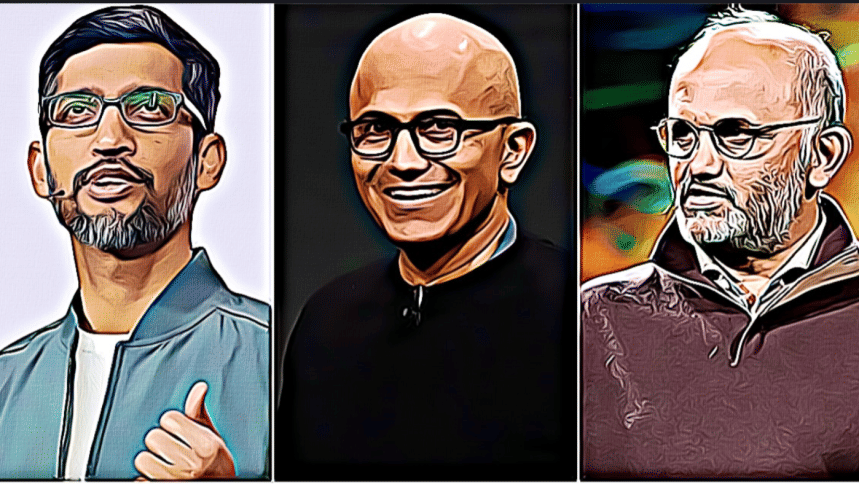Tech giants helmed by Indian-origin CEOs: The parade continues

Parag Agrawal being appointed Twitter's new CEO marks yet another Indian-born tech executive stepping up to be a new leader of the global tech industry. Just in January this year, we had Arvind Krishna, another Indian-American business executive, promoted to the Chairman of IBM. He had also been serving as the CEO of IBM since April 2020.
Google, Microsoft, Adobe, IBM, Palo Alto Networks, and now... Twitter is run by CEOs who grew up in India.
Some big names to be included in this list are Sundar Pichai, CEO of Alphabet Inc., the parent company of Google, since 2015; Satya Nadella, CEO of Microsoft since 2014 and Executive Chairman since 2021; Shantanu Narayen, Chairman, President and CEO of Adobe Inc. since 2007; Nikesh Arora, CEO of Palo Alto Networks since 2018; and Ajaypal Singh Baga, former President and CEO of Mastercard from 2010 to 2020.
The recent surge of Indian-born CEOs is a fantastic success for Indians in the technology world. Reports suggest that about 15% of the engineers in Silicon Valley are Indian in origin. As a whole, Indian-born tech experts constitute the most significant percentage of immigrant tech-company founders, even more than the combined percentage from Britain, Japan, China and Taiwan.
This rise can be attributed to a few key factors that make these Indian-American executives unique choices as tech leaders.
Perhaps the most important of these factors is their educational background. Parag Agrawal is a graduate of the Indian Institute of Technology Bombay (IIT) and a PhD in Computer Science from Stanford University. Both Satya Nadella and Shantanu Narayen hails from Hyderabad but studied in two different but similarly reputed national engineering universities. Nadella completed his Bachelor's in electrical engineering from Manipal Institute of Technology (MIT Manipal). Narayen finished his Bachelor's in electronics and communications engineering from the University College of Engineering, Osmania University (UCE).
These regional engineering universities are famous for honing talent to international levels of competition, and unsurprisingly, almost all of these high-profile engineers ended up pursuing MS, MBA and PhD degrees from various US universities. This combination of regional and international expertise has made these CEOs masters of inter-work communication and talent relations, alongside their degree-related mastery of electronics engineering.
Another key factor has to be their revolutionary method of approaching the tech market. Back in December 2019, after Agrawal had been appointed in charge of Twitter's Project Bluesky, an open and decentralised standard for social media aimed to combat false information and online bullying, he had expressed the need to create a platform that promotes free speech in a healthy manner. In an interview with Technology Review last year, he said, "Our (Twitter's) moves are reflective of things that we believe lead to a healthier public conversation. Focus less on thinking about free speech but thinking about how the times have changed. Most people can speak. Where our role is particularly emphasised is who can be heard. The scarce commodity today is attention."
In a similar vein, Alphabet Inc. CEO Pichai is responsible for creating the ever-popular Chrome web browser, despite the then CEO Eric Schmidt initially opposing the idea. Joining Google in 2004 as a material engineer, Pichai ended up leading the development of the Chrome OS and Google Drive and being the brain behind Chromebooks. Sanjay Jha, another Indian-American tech business executive and the former CEO of Motorola, is famous for saving the company by getting rid of the Symbian product line and shifting Motorola's focus on Android platforms. Before Jha had joined, Motorola's market share in the US was a measly 7%. During his tenure, he released the widely popular Moto G series and raised the market stock of Motorola to the point of Google buying it for a whopping $12.5 billion.
Academic excellence and revolutionary mindset aside, the adaptability and diversity represented by Indian-born tech executives is something the world, predominantly US-based global industries, solely needs. According to a survey by Deloitte, a global provider of financial and audit consultation, about 70% of employees find cultural and ethnic diversity in senior management to be a motivational factor in the workplace. Coincidentally, Deloitte is also run by an Indian-American businessman, Punit Ranjen, CEO since 2015.
India is home to over 40,000 multi-national companies and over 2,50,000 overseas affiliates, which means a tech graduate from India comes well-versed with international tech standards and business practices, immediately putting them a step above other international graduates. US companies allowing Indian-born executives to step up to be the next tech giants also represent global solidarity, impeding discriminatory practices in the past.
The parade continues, paving the path for aspiring future engineers of Indian origin.

 For all latest news, follow The Daily Star's Google News channel.
For all latest news, follow The Daily Star's Google News channel. 



Comments